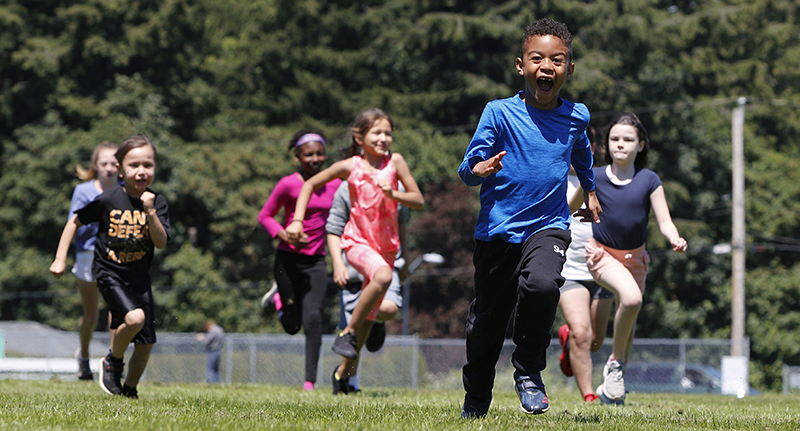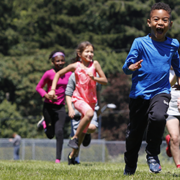Jean Buckler Researcher Profile

I am an Assistant Professor in Exercise Science, Physical and Health Education at the University of Victoria, and my research focuses on physical literacy. I was introduced to physical literacy during my PhD as a concept at the International Physical Literacy Conference 2015 in Vancouver. I was fascinated with the approach, where each individual’s movement journey was considered, which was a big contrast to the developmental timelines and anticipated outcomes that I had studied in motor development frameworks. I integrated physical literacy concepts into my doctoral dissertation and my postdoctoral fellowship work. As an early career researcher, I focus on physical literacy and how it can support the development of physical activity behaviours, and support continued participation at key time points in life. At the moment, my work focuses specifically on physical literacy in the early years, during adolescence, and for those who are new to Canada.
Early Years
In my work in the early years (0-5 years), I have been able to collaborate and work with researchers across Western Canada to explore how we can empower key adults in children’s lives, like parents and early childhood educators, to support children in developing a positive physical literacy trajectory. The early years such a pivotal time for developing physical literacy, when children are excited about trying new things and confident in their skills. Supporting those key adults in fostering a positive movement environment at this critical time can be a catalyst for positive physical literacy trajectories and lifelong enjoyment of physical activity. As a parent of two young children, I have witnessed firsthand what a supportive movement environment can look like, and have seen my children thrive when they are given the tools and opportunities to move freely, take risks, and try new things.
Adolescent Years
The adolescent years are a major time of physical activity drop out. We know that adolescents start to spend less time in physical activity, partially due to withdrawal from sport participation. What we don’t know is how to keep adolescents moving, even if they choose to withdraw from sport. We also don’t know the role that physical literacy plays in adolescence, in keeping adolescents in sport or physical activities, and how we can support adolescents in developing new strategies for engaging in physical activity when they move away from activities they have participated in prior. This is particularly important as adolescents are also at higher risk of developing mental health disorders, and physical activity is a known protective factor for mental health. We are currently collecting data with adolescents (13-17 years) in the Greater Victoria region, to develop an understanding of the interrelationships between physical literacy, physical activity, and mental health. Within this project, we are led by a community advisory board of youth aged 13-18 years old. This project is funded by a Social Sciences and Humanities Research Council Insight Development Grant.
Newcomers
Finally, I have had the opportunity to collaborate with Sport for Life in developing and implementing an evaluation strategy for the “Wellness through Community Connections: A Newcomer Initiative through Physical Activity for Greater Victoria” project led by Kabir Hosein. The program supports people who are new to Canada to get involved in physical activity or sport through a peer mentorship model. Physical activity and sport can be incredibly positive environments, and support a sense of community, but we need to ensure the systems and structures that are in place, through local sport, physical activity, and recreation organizations, understand the barriers to engagement and how to overcome them for people who are new to Canada. This project is funded by a Social Sciences and Humanities Research Council Partnership Engage Grant.
Teaching at UVic
Within my role at the University of Victoria, I also teach our first year Physical Literacy course. Over the term each year, I get to watch my students gain a deep understanding of the importance of physical literacy, and how teachers, parents, and our community can support positive movement behaviours for people of all ages. A highlight for the course students each year is their practical teaching experience, when we bring in 50+ elementary aged children to be taught in our gym at the university. The nervous excitement is palpable when the sounds of 50 nine-year-olds echo down the hallway, but by the end of the hour all of the students, elementary and university aged alike, are smiling and laughing. Supporting our university students, many of whom go on to become recreation, education, and healthcare leaders in our communities, to experience first hand the power of movement and play is one of the most rewarding parts of my job.
In all areas of my work and life physical literacy is present. I believe in living what I teach, and whether I am biking to work in the rain, hiking a local hill with my family, or making my children laugh as I attempt the monkey bars on the playground, I am always finding ways to move joyfully. If you are interested in understanding more about my work in physical literacy please reach out.

